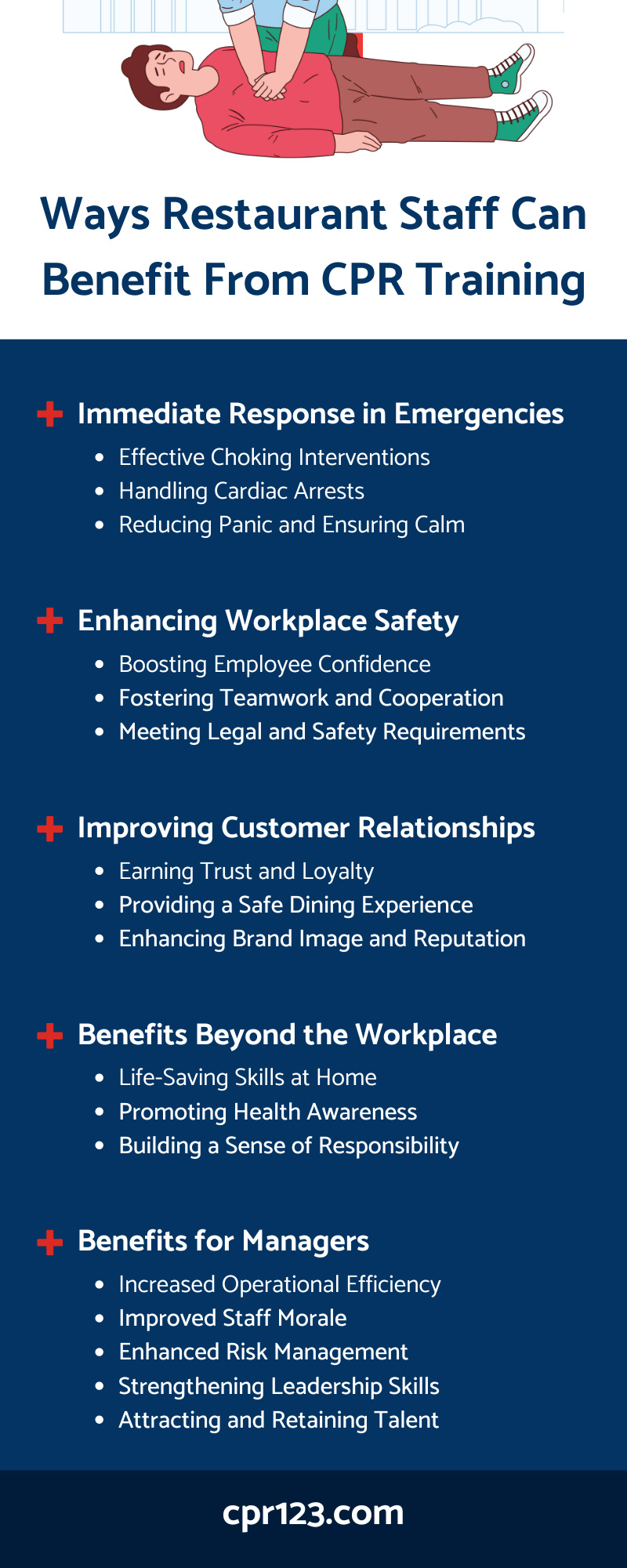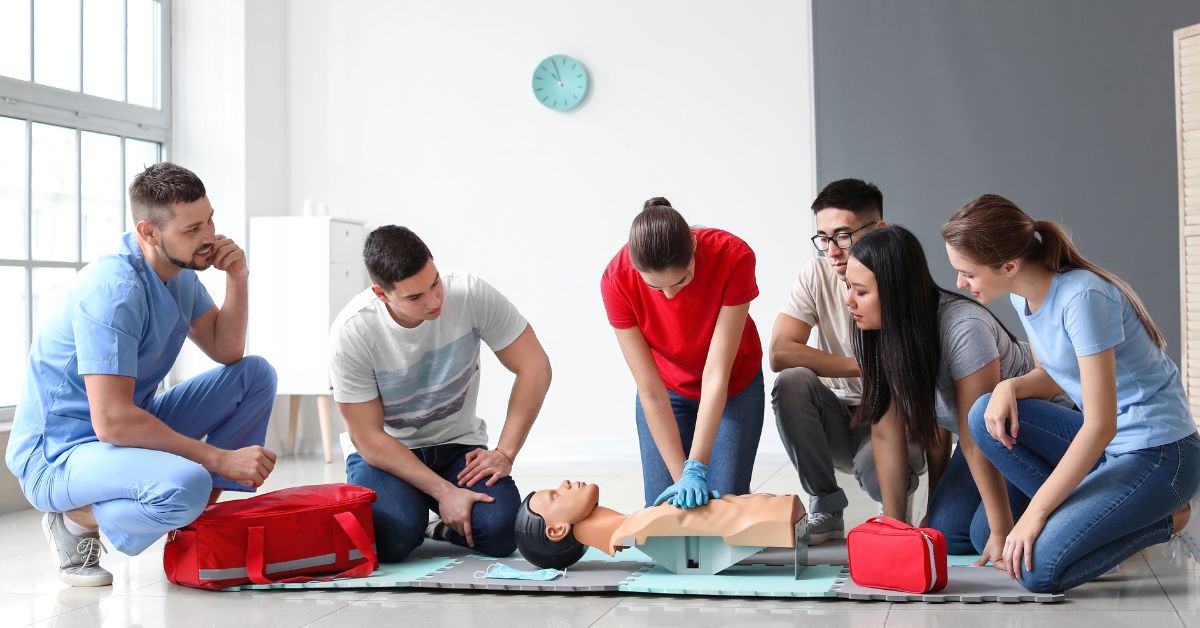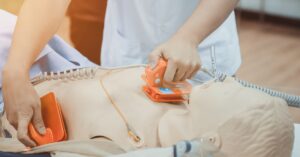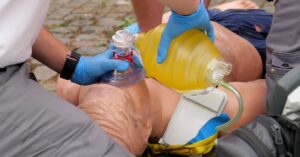Running a successful restaurant requires good food and hospitality, but you can only attain this with rigorous skill-building, including the proper reactions to medical emergencies. Training your staff to react in emergencies improves the dining experience for customers and the workplace for coworkers. One skill many people may not see as valuable in the restaurant industry is CPR. Most believe that knowing CPR requires a medical background–but that is not true. Find out the ways restaurant staff can benefit from CPR training.
Immediate Response in Emergencies
In the event of an emergency, every moment counts. Trained staff members can provide immediate assistance before medical professionals arrive. This quick response improves the patient’s chances of survival, particularly in cases of cardiac arrest where brain damage can occur within minutes.
Effective Choking Interventions
Choking is a common hazard in restaurants. Staff trained in CPR familiarize themselves with the Heimlich maneuver and other techniques to clear a blocked airway. This knowledge can prevent minor incidents from becoming tragedies.
Handling Cardiac Arrests
Sudden cardiac arrest can happen without warning. CPR training enables staff to perform chest compressions and rescue breaths, maintaining circulation and oxygen flow to vital organs until paramedics arrive. This type of intervention can significantly improve a person’s chance of surviving.
Reducing Panic and Ensuring Calm
Panic can spread quickly in emergencies, causing chaos and hindering an effective response. Training helps staff remain calm and focused to reassure everyone, from the staff to customers, and guide them on what to do. This composed demeanor prevents future accidents and creates a manageable environment.
Enhancing Workplace Safety
A safe working environment is essential for both staff and customers. Implementing CPR training as part of the workplace safety protocol can have far-reaching benefits, contributing to overall well-being and peace of mind.
Boosting Employee Confidence
Incorporating this knowledge into your training protocols enhances staff confidence. They feel more capable and empowered to act, which improves overall performance and job satisfaction. Confident employees are also more likely to provide better customer service and create a positive dining experience.
Fostering Teamwork and Cooperation
CPR training often involves team-based scenarios, encouraging staff to work together and support each other in high-pressure situations. This collaboration fosters unity and cooperation, leading to smoother day-to-day operations.
Meeting Legal and Safety Requirements
In many regions, having CPR-trained staff is a legal requirement for specific business types. To avoid potential fines or legal issues, restaurant owners in these areas require staff to be certified in CPR upon hiring or pay for their training during their orientation period.
Improving Customer Relationships
Customers appreciate knowing the place they dine at puts their safety first, and they tend to connect better with staff trained in other things beyond their job description. By having a CPR accreditation, staff are more secure in their competence to meet each patron’s needs.
Earning Trust and Loyalty
When customers witness staff responding effectively to emergencies, it builds trust and confidence in the restaurant’s ability to manage unforeseen situations. Quick and competent reactions can increase customer loyalty and positive word-of-mouth recommendations.
Providing a Safe Dining Experience
A restaurant that ranks safety high on its list of priorities has a better chance of providing guests with a welcoming and secure atmosphere than restaurants that don’t. Providing a safe dining experience is vital for many types of diners, including parents with young children, elderly patrons, and individuals with health concerns. These populations are more likely to dine out when they know restaurant staff are ready to react to emergencies and capable of helping.
Enhancing Brand Image and Reputation
A commitment to safety and preparedness reflects positively on the brand. Customers are more likely to support businesses that demonstrate a genuine concern for their well-being. This positive image can set the restaurant apart from competitors and contribute to long-term success.
Benefits Beyond the Workplace
The advantages of CPR training extend beyond the restaurant setting, benefiting staff in their personal lives and contributing to the community’s overall safety.
Life-Saving Skills at Home
Employees trained in CPR can use their skills outside of work, potentially saving the lives of family members, friends, or strangers in need. This valuable training empowers individuals to be effective in various situations.
Promoting Health Awareness
CPR training often includes education on recognizing the signs of medical emergencies. This knowledge can inspire staff to adopt healthier habits and encourage others to do the same.
Building a Sense of Responsibility
Being equipped with life-saving skills instills a person with a sense of responsibility and duty toward others. Staff who undergo CPR training are more likely to take initiative in emergencies at work and in their personal lives.
Benefits for Managers
Managers who ensure their staff are CPR trained fulfill an ethical duty and reap significant operational and managerial benefits.
Increased Operational Efficiency
With a team well-versed in emergency protocols, managers can trust that their staff will manage unexpected situations well. This preparedness minimizes disruptions and allows the restaurant to continue operations smoothly, even in emergencies.
Improved Staff Morale
Employees who receive valuable training like CPR will likely feel more appreciated and cared for by their employers. Investing in their well-being fosters loyalty, reduces turnover, and creates a more committed and motivated workforce.
Enhanced Risk Management
Managers effectively enhance the restaurant’s overall risk management strategy by equipping staff with CPR training. This proactive approach can lower insurance premiums, reduce potential liability in emergencies, and maintain compliance with health and safety regulations.
Strengthening Leadership Skills
Offering CPR training to staff can also serve as a development opportunity for managers. By leading and participating in such training programs, managers can further hone their leadership and crisis management skills, which are critical in the hospitality industry.
Attracting and Retaining Talent
A restaurant that prioritizes staff training and safety can attract high-quality candidates looking for a supportive and growth-oriented work environment. This focus on employee development helps retain top talent, ensuring the restaurant succeeds.
Prioritize CPR Training Today
Incorporating CPR training for restaurant staff is a crucial step toward ensuring the workplace is safe and prepared. The benefits of providing restaurant staff CPR training are clear: improved emergency response, enhanced workplace safety, better customer relationships, and valuable life skills beyond the job.
Restaurant owners, it’s time to invest in your team’s safety and well-being. Prioritize CPR training through reputable programs like CPR123, and equip your staff with the skills they need for handling medical emergencies. Take the next step toward a safer work environment and customer dining experience by giving employees more opportunities for skill development, such as non-clinical healthcare certifications. These certifications improve emergency response protocols and lead to a better work environment.








